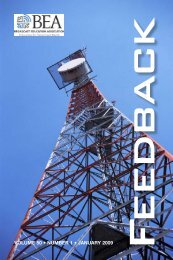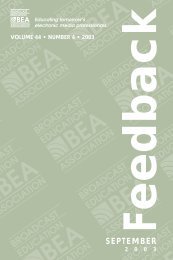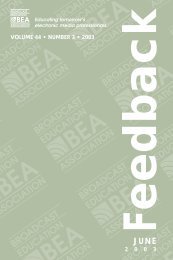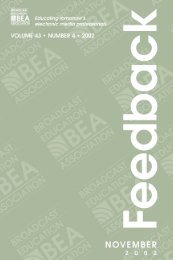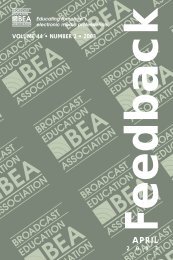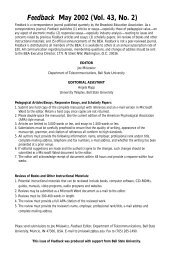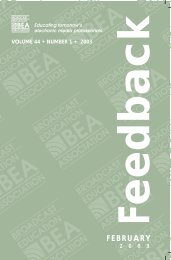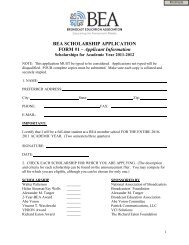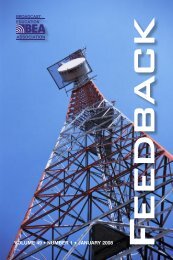Feedback
Feedback May 2005 - Broadcast Education Association
Feedback May 2005 - Broadcast Education Association
Create successful ePaper yourself
Turn your PDF publications into a flip-book with our unique Google optimized e-Paper software.
quality” rating, as adding a new professor to the list takes more effort than disgruntledstudents wish to invest)• an aura of uneasiness when the bi-modal nature of the ratings shunts them towardthe green faced icon of “average quality”• inevitable depression and/or biting dismissal of the site once the person settles intothe bell-curved norm of “average quality,” or dips into the sour blue frowning face of“poor quality.”MANAGEMENT TECHNIQUESRatings-triggered depression does not always have to be the case, however. Otherthan taking a course of ignoring the site and its ratings altogether, there are strategiesone may adopt to manipulate their online image and counter the effects ofRateMyProfessor. In taking this tact, three methods come to mind:• reactive reporting• exigencial countering• proactive managementReactive reporting is simply a method of noting inaccurate qualitative commentsleft by users to the site’s school moderator. Although the site steadfastly proclaims itsfree right to post such comments, in general questionable qualitative comments willbe removed. While the numerical ratings, and summed facial icon remain unchanged,this is a small victory in image protection as these comments, due to their uniquenature, tend to be more memorable and hence damning than the Likert scale ratings.The second method that can be used is exigencial countering, or, simply put, addingin your own responses and ratings. Although questionable in its ethics, this method iseffective both for boosting one’s scores over either of the two ratings thresholds (i.e.,moving one from below average to average or even above average) but also bumpinghurtful qualitative comments down in the queue of viewable comments to the generalpublic, as the site is currently set up to limit ratings access for casual non-paying usersto the ten most-recent ratings for an individual.It should be noted that if students become aware of this action, exigencial counteringcan have the unintentional consequence of inciting additional negative ratingsby students, many of whom will harp with indignant comments along the lines of “Ithink this professor rates herself - beware!” further disempowering and discrediting theinstructor.A wiser, although far more time-consuming course of action, is proactive management.I have used this technique with relative success over the past three years. Keyto this technique is classroom acknowledgement of one’s presence on the site. I generallydo this during the minutes prior to the start of class, casually dropping a sense ofbemusement about my new Internet fame or infamy. It is my feeling (although this ischanging with the passing of time) that many students are under the impression thatinstructors are oblivious about the presence of the site. Acknowledging student wit(of which seems to be a main goal, regardless of the quantitative rating) often defusesstudent anger as it gives them the impression that their complaint has been heard.Furthermore, given the class and date information left with each rating, it is fairly easyto deduce who complaining students are, despite their perceived anonymity. Noting thereciprocal nature of the system, a simple check of the grade book for a poor score onBEA—Educating tomorrow’s electronic media professionals 9



